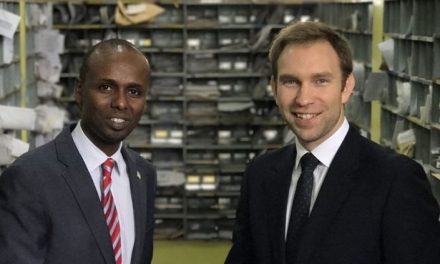
New Courier Industry And Way Forward
New Courier Industry And Way Forward
From AFRICA NEWS SERVICE, May 3rd, 2001
Lagos, May 03, 2001 (The Post Express/All Africa Global Media via COMTEX)–
Stakeholders and key players in the courier industry last week gathered under
the aegis of the first- ever Nigerian Courier Summit organised by the Nigerian
Postal Service to fashion a new way forward in the industry. The summit, which was held in Lagos, served as a forum for professionals and
corporate bodies involved in the movement of mails, parcels and cargoes to
develop the courier industry in Nigeria through healthy inter-organisational
relationships. The organisers believe that at the end of the programme, participants would be
able to transform competitions to co-operation and find solutions to varied
misdeeds or malpractices currently going on in the industry. * to identify and work out modalities for sustainable growth and development
of courier industry in the 21st century * to design strategies for achieving the targets set for the eradication of
problems and achieving economic growth in the courier industry * to develop an action plan for implementation, monitoring and evaluation of
resolutions of the summit and * to create a forum for stakeholders in Nigerian courier industry to dialogue
and cross-fertilise ideas on the state of the industry in the 21st century
etc. The forum, which attracted all registered operators in the industry, drew
experts in the business who also spoke on several topics. Addressing the participants before declaring the summit open, the Minister of
State for Communication, Alhaji Adekunle Haruna Elewi reminded the operators
of the need to operate within the law. He also told them that the dynamics of the national economy should provoke
them to be innovative. Such economic forces, he stated, are deregulation and
new forms of communication adding that deregulation brings about competition
which invariably will improve services. While noting that consumers were under-served, he disclosed that the role of
courier companies can never be over-emphasised hence it was because of the
extreme need and stupendousness of the responsibilities0f the national courier
that the government considered it expedient and appropriate to promulgate
Decree No 41 of 1992. Not only that, Elewi restated the fact that it is only in a stable environment
that investors can invest as no investor can invest in an unsteady
socio-political milieu. On this note, he advised the youth to eschew
restiveness as their actions might send wrong signals to potential investors. Outlining what the government is doing to arrest youths unrest, he said that
the President had taken several measures to revamp the economy through the
improvement of the industrial climate and stimulation of higher capacity
utilisation, provision of a level- playing field to investors in the various
sectors of the economy and the encouragement of diversification of foreign
exchange earnings through increased export activities especially in the
non-oil sector etc. Dwelling on the vexing issue of professional malpractices, such as accepting
contraband goods, pilfering and fakery, the Minister warned that the
government would not hesitate to revoke the licences of offenders or prosecute
them. "Let me sound a word of warning therefore that there would be no sacred
cow in the application of rules aimed at instilling not only sanity but
probity and transparency which had remained the hallmark of the Obasanjo
administration" Elewi said. In his speech, the chairman, Board of Directors of NIPOST, High Chief Samuel
Nwanganga sought for a team spirit among the professionals so as to chart a
new course for the future of the industry. The chairman, further noted that
Nigeria is a big market for courier business saying that as a developing
market, Nigeria has the potentials to be one of the biggest markets in Africa. He therefore called for co-operation among the practitioners and reminded them
that the President is interested to see that the courier industry in Nigeria
delivers first-class services to her citizens. "Our President, Chief Olusegun Obasanjo (GCFR) is a leader in a hurry to
deliver his mandate "the NIPOST chief restated. On the part of the leadership of NIPOST, he warned, no organisation shall be
allowed to be a cog in the wheel of progress, advising quacks and flaughters
of the rules and regulations to give way for the new courier industry that
would unfold after the summit. It must be recalled that prior to Obasanjo regime, the Nigerian Postal Service
suffered serious neglect by the military government. Subsequently, all sorts of postal malpractices prevailed. NIPOST was used as a
harbour for 419 businesses. Even the staff themselves were used to transact
various illegal courier businesses. Parcels and mails that contained valuable
items were ripped open and dumped by the staff who were paid with tax-payers'
money. Inter-city letters or mails got to their destinations a year or two after
postage while inter-state mails might not get to their destinations at all.
Not to mention Europe-bound materials. Consequently, Nigerians felt there was no need writing letters anymore or
sending parcels to their loved ones. In fact, NIPOST, as a government agency was a suspect, abandoned by the
government and rejected by the populace. Thus, there was a great demand for
reliable, trustworthy and business-oriented courier companies. This quest gave rise to private courier companies like DHL, Fenway, United
Parcel Services (UPS), Abek, Afrolink, Airborne Express, AM World Courier,
City Messenger, Continental Parcel, Corporate Messenger, Fedex, IAS, Pioneer
Express, Network Express and others. However, by virtue of Decree 41 of 1987, the Federal Military Government then
reposed in NIPOST the power to register these private courier of companies. Given the fact that the head was rotten, a number of the courier companies
therefore cashed in on that to perpetrate all sorts of evils without checks. Because courier companies failed, banks now took over courier businesses by
transferring money and valuable materials both internally and internationally. But since coming to power of President Olusegun Obasanjo, he has vowed to
return trust and confidence to the national courier. First, he appointed business-oriented management to rehabilitate the already
decomposing courier giant and gave it the free hand to run the company to
credibility and profitability. Ever since, a number of innovations have been noticed. In November last year,
postcode, which is a system of sorting and delivering mails faster was
introduced. In addition to that, the President directed that all the post office projects
abandoned by the military governments all over the country should be renovated
and completed as part of efforts to reposition the ailing company to the level
of competition with the private courier companies. Right now, the board of directors is undertaking an assessment tour of NIPOST
facilities all over the country to ascertain the level of decomposition with a
view to resuscitating or replacing them. However, the efforts seem to be paying off as Nigerians have once again begun
to witness prompt and efficient postal service. Courier business was one of the legacies bequeathed to Nigerians by the
colonial masters. Much confidence was placed on post office because of their
efficient and prompt delivery. Then nothing was heard about private courier companies as there was no need
for them. Movements were reduced as people preferred to communicate through
letters. Consequently, accidents and other road mishaps were reduced. With the advent
of military governments, little or no emphasis was placed on postal services
which led to a gradual decay of the service. Though the efforts of Obasanjo government at restoring confidence in NIPOST
are commendable, more steps should be taken in the areas of training. The NIPOST training school should be rehabilitated and put back to more
functional use and staff should be trained on the new technology of delivering
mails. Staff who were employed during the military administrations need to be
trained so as to meet the International Postal Union (ITU) standard. Thus
unprofessionalism would be curbed. Furthermore, staff at the counter should be trained to be more cauteous and
polite to customers Also, the government should ensure uninterrupted electricity supply as some of
the equipment cannot function properly with irregular power supply and efforts
should be geared at eliminating quackery in the industry to avoid the
reminiscences of the old NIPOST. by Isaac Anumihe Copyright The Post Express. Distributed by All Africa Global
Media(AllAfrica.com)
-0-
KEYWORD: Nigeria
Press, Media and Communications
Economy, Business and FinanceAFRICA NEWS SERVICE, 03rd May 2001












